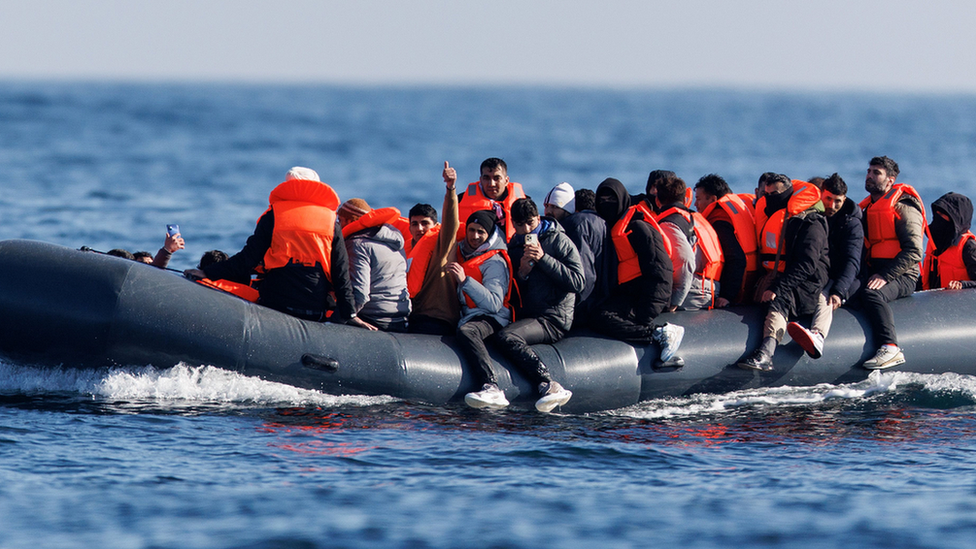MPs reject Lords amendments to Rwanda bill

- Oops!Something went wrong.Please try again later.
MPs have rejected all changes to the Rwanda bill made in the House of Lords in an ongoing parliamentary stand-off.
The much-debated bill will now return to the upper chamber for further scrutiny on Tuesday.
It comes as reports suggest the UK held talks with other countries, including Armenia, about replicating the scheme.
The plan to send some asylum seekers to Rwanda has faced setbacks since it was first announced in April 2022 by Boris Johnson's government.
The bill, which declares Rwanda safe, is likely to pass this week - with the government majority meaning any further amendments made by peers should be overturned.
It will not become law until both Commons and Lords agree on the final wording, a process known as parliamentary ping-pong.
It will now returns to the Lords, where peers are set to review it on Tuesday - possibly making additional changes that could extend the parliamentary disputes.
In the vote on Monday, MPs rejected six amendments, one of which would have granted a removal exemption for people who had supported the UK's armed forces overseas.
The government also rejected calls to exempt victims of modern slavery from the Rwanda scheme, instead proposing its own amendment that would provide an annual report on the impact of the policy on victims, which then passed.
As reported in the Times, internal government documents show Costa Rica, Ivory Coast and Armenia have been considered as options for similar schemes, if Rwanda proves successful.
The BBC has seen some of the documents, which are from several months ago, and understands the list is accurate.
The early stage plans are described by sources as in a "holding pattern", with other countries keen to see if the Rwanda plan actually gets going before trying anything similar themselves.
Other African nations, including Morocco, Tunisia, Namibia and Gambia, "explicitly declined" to enter technical discussions, according to the Times.
Sir Matthew Rycroft, the top civil servant at the Home Office said the document was "out of date" and it should not be assumed there are active negotiations with other countries.
He told the Commons Public Accounts Committee the Foreign Office had assessed a lot of countries but only "a tiny number" had progressed to the next stage.
A government spokesperson said the UK "is continuing to work with a range of international partners to tackle global illegal migration challenges" but its current focus was on passing the Rwanda bill and putting plans in place to get flights off the ground as soon as possible.
'Doomed to fail'
Labour believes the scheme is flawed and intends to scrap it if it wins the general election, expected to be held later this year.
Shadow immigration minister Stephen Kinnock said the Rwanda scheme is "doomed to fail" calling it "fundamentally unworkable, unaffordable and unlawful".
Sir Keir Starmer has said he would instead focus on targeting criminal gangs and negotiating new security arrangements with Europe.
Speaking in the House of Commons, Mr Kinnock said he hoped the Conservatives "will come to understand that hard graft and common sense are always more effective than the sugar rush of a tabloid front page".
Meanwhile, charities supporting asylum seekers are also planning to launch legal challenges "as quickly as possible" against deporting people to the east-central African country if the bill becomes law this week.
Labour peer Baroness Chakrabarti said the Lords amendments sought to improve the bill and did not attack "the central plank of the policy".
She told BBC Radio 4's Today programme her own amendment would restore "the jurisdiction of domestic courts, who are defenestrated by this bill".
However, Conservative MP Sir John Hayes said legal appeals had been used to block deportations and "frustrate" the will of Parliament and government policy.
Prime Minister Rishi Sunak has repeatedly said flights to Rwanda would take off by spring, but refused to name a specific date.
Ministers believe the legislation will pave the way for the first removals to the country within weeks.
The Safety of Rwanda Bill declares the country safe and was introduced to Parliament after the Supreme Court ruled unanimously that the government's scheme was unlawful.
In its ruling, the court said genuine refugees being deported there would be at risk of being returned to their home countries, where they could face harm.
The Rwanda scheme was originally introduced by then-Prime Minister Mr Johnson in April 2022 with the aim of acting as a deterrent to people from arriving in the UK on small boats across the English Channel.
It has faced a number of legal challenges since, and so far no-one has been sent to the east African country under the scheme.
The bill aims to protect the scheme from further legal setbacks.
It comes as 534 migrants crossed the Channel in 10 boats on Sunday - the highest daily figure this year.
It brings the total for 2024 so far to 6,265, an increase of 28% on the same period last year.

